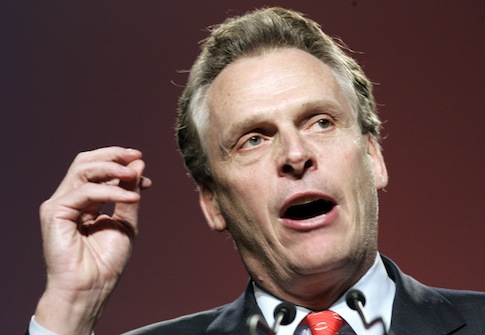The leading candidates for Virginia governor will meet for their first debate on Saturday, where Democrat Terry McAuliffe will likely face criticism of business deals that have netted him millions despite their relative lack of success.
One company that Republican Ken Cuccinelli may mention is Telergy. Based in McAuliffe’s hometown of Syracuse, N.Y., the company paid him $1.2 million during his tenure there.
Shortly after McAuliffe joined the company, it received a large cash infusion from another company with which he was involved. Shortly after he left Telergy, it laid off hundreds of employees, who received no severance payments. The company later declared bankruptcy.
McAuliffe invested $100,000 in telecommunications company Global Crossing in August 1997. He would eventually net millions—1999 reports estimated $18 million; McAuliffe insisted he only made $9 million—when he sold his stake years later.
Telergy and Global Crossing have already featured prominently in Republican attacks.
"Terry McAuliffe’s well established record of trading access for cash and questionable business deals leave him entirely unfit to serve as Virginia’s next Governor," Cuccinelli campaign strategist Chris LaCivita said last week, citing both companies.
"I bought stock and I sold stock. That's capitalism," McAuliffe explained when asked about his handsome profit on his investment in Global Crossing, which also went on to declare bankruptcy. "If you don't like it, leave the country and move to China."
Before selling his Global Crossing stake, McAuliffe was elected to Telergy’s board of directors.
In that capacity, he was paid $1.2 million for "assisting [Telergy] in raising equity capital," according to a company SEC filing. He reportedly helped broker a $40 million investment by Global Crossing, also a telecommunications firm, in Telergy.
In August 2001, McAuliffe and other top executives left the company, which was careening towards bankruptcy. By December, the company had laid off nearly 450 employees and filed for bankruptcy protection.
Other aspects of McAuliffe’s private sector experience, which he touts as a qualification, have come under criticism.
His work with electric vehicle manufacturer GreenTech Automotive has not produced a boon for his campaign, possibly due to controversy over the political connections underlying its business strategy and its use of a fraud-prone funding scheme.
Observers expect GreenTech, Global Crossing, Telergy, and other McAuliffe business misadventures to play a role in Saturday’s debate.
McAuliffe’s campaign did not respond to a request for comment.
